You've got a brilliant idea for a music streaming app.
The tech stack is ready. The UI looks stunning. Your team is excited.
But here's the thing that keeps most founders up at night: compliance.
And honestly? It should.
Because launching a non-compliant music streaming app isn't just risky, it's a guaranteed path to lawsuits, massive fines, and potentially shutting down before you even get started.
The music streaming industry is one of the most heavily regulated digital spaces on the planet.
You're not just dealing with app store guidelines or basic data privacy laws. You're navigating a complex web of music licensing agreements, copyright laws, international data regulations, payment compliance, and dozens of other legal requirements that vary by country.
One missing license? That's millions in penalties.
A data breach because you skipped security protocols? Say goodbye to user trust and hello to GDPR fines that could reach 4% of your global revenue.
Failed to implement proper age verification? You've just violated COPPA and opened yourself up to $53,088+ per violation.
But here's the good news: compliance doesn't have to be overwhelming.
When you understand what music streaming app compliance actually means and, more importantly, why it matters, you can build it into your foundation from day one.
This guide will walk you through everything you need to know about how to make your music streaming app compliant, from basic definitions to actionable checklists.
Whether you're building your first app or you're an investor evaluating a streaming platform, you'll learn exactly what compliance looks like in 2025 and beyond.
Let's get in:
Think of it like building a house. You need the right permits, you need to follow building codes, you need proper electrical wiring, plumbing that meets standards, and fire safety measures in place.
Skip any of these? Your house gets condemned.
The same logic applies when you create a music streaming app.
The Four Core Pillars of Music App Compliance
When we talk about music streaming app compliance, we're really talking about four main areas:
1. Music Licensing and Copyright Compliance
This is the big one. The non-negotiable foundation of your entire business.
You need legal permission to stream every single song on your platform. And "permission" here means paying licensing fees to multiple rights holders for each track.
We're talking about mechanical rights, performance rights, synchronization rights, and master recording rights.
Miss even one? You're looking at copyright infringement lawsuits that could cost you hundreds of thousands, or even millions, per violation.
2. Data Privacy and Security Compliance
Your users trust you with their personal information. Their names, email addresses, payment details, listening habits, and location data.
That trust comes with massive legal responsibility.
GDPR in Europe, CCPA in California, LGPD in Brazil, & PIPEDA in Canada.
These aren't suggestions, they're laws with real impact. And the fines for violations can be astronomical.
You need proper consent mechanisms, data encryption, secure storage, the ability for users to delete their data, and transparent privacy policies that actually explain what you're doing with their information.
3. Technical and Security Compliance
This is where music app compliance gets into the nitty-gritty of how your app actually works.
Are your payment systems PCI DSS compliant? Is your infrastructure secure against breaches? Do you have proper API security? Are you following cybersecurity best practices?
The integration of AI in Music Streaming apps for features like personalized recommendations and automated content moderation introduces a new layer of technical compliance.
Partnering with an experienced AI app development company is crucial to navigate these requirements, ensuring your AI models are built with privacy and fairness by design, adhering to emerging regulations like the EU AI Act.
4. Platform and App Store Compliance
Want your app on the Apple App Store or on the Google Play Store?
You'll need to follow their rules, such as In-app purchase guidelines, content moderation policies, age rating requirements, update frequency standards, & All of them.
These platforms can and will reject your app or pull it from their stores if you don't comply with their terms.
Legal Compliance vs. Technical Compliance: What's the Difference?
Here's where things get interesting.
Legal compliance is about following laws and regulations. These are mandated by governments and regulatory bodies.
Things like:
-
Paying royalties to artists and rights holders
-
Protecting user data under privacy laws
-
Following advertising regulations
-
Complying with tax requirements in each jurisdiction
You don't get to choose whether to follow these. They're the law.
Technical compliance is about implementing the right systems and processes to enable legal compliance and to meet industry standards.
Things like:
-
Encryption protocols for data security
-
Age verification systems
-
Content filtering algorithms
-
Accessibility features for disabled users
-
Payment processing security standards
Here's the catch: you need both.
Having great legal documentation means nothing if your technical infrastructure can't actually enforce those policies.
And having tight music app security means nothing if you're missing the legal licenses to operate.
Why "Good Enough" Isn't Good Enough?
Look, we get it. Compliance feels like bureaucratic overhead.
You want to move fast. You want to disrupt the industry. You want to get to market before your competitors.
But here's the reality: music streaming app compliance isn't optional.
This isn't like skipping a feature launch or pushing back a marketing campaign.
Non-compliance doesn't just slow you down; it shuts you down completely.
Spotify spent years and hundreds of millions of dollars fighting copyright lawsuits because of compliance gaps. And they eventually paid out massive settlements.
Smaller companies? They don't survive those mistakes.
Why is Music Streaming App Compliance Necessary?
Let's be honest for a second.
Nobody wakes up excited about compliance paperwork.
You didn't dream of building a music streaming app so you could spend months negotiating licensing agreements and reviewing privacy policies.
But here's what keeps successful founders different from the ones who flame out: they understand why music app compliance is necessary.
Not as a boring legal checkbox. But as the literal foundation that determines whether your app survives or gets crushed.
Because in the music streaming world, non-compliance isn't a speed bump. It's a brick wall hitting right at your face.
Let's break down exactly what's at stake and why getting this right from day one is the smartest business decision you'll ever make.
1] Avoiding Lawsuits and Heavy Fines
Here's a fun fact that'll make your accountant nervous: copyright infringement penalties in the US can reach up to $150,000 per song.
Yes, you read that right: It’s per song.
Now multiply that by thousands, or even millions, of tracks on your platform.
Do the math. It's terrifying.
And we're not talking about hypothetical scenarios here. This stuff happens all the time.
Remember when Spotify got hit with a $1.6 billion lawsuit over unpaid mechanical royalties? Or when they settled another case for $112 million because they couldn't properly track song ownership?
That's not because Spotify is reckless. It's because music licensing is insanely complex, and even small gaps in compliance can snowball into massive legal exposure.
But it's not just copyright laws you need to worry about.
GDPR violations? The EU can fine you up to €20 million or 4% of your global annual revenue- whichever is higher.
COPPA violations for failing to protect children's data? That's $50,000+ per violation. And if you've got thousands of underage users whose data you mishandled, well... you see where this is going.
Payment processing violations under PCI DSS? Data breach lawsuits? Accessibility discrimination claims?
The list goes on. And on. And on.
Here's the thing: these aren't scare tactics.
These are real costs that real companies have paid because they didn't prioritize compliance early enough.
Every dollar you invest in making your music app compliant now saves you tens of thousands, potentially millions, in legal fees, settlements, and fines later.
It's not sexy. But it's the difference between building a sustainable business and burning through investor money on lawsuits you could have prevented.
2] Building Trust with Users and Investors
Trust is currency in the streaming world.
Your users are handing you their personal data. Their payment information. Their listening habits. In many cases, data about their kids.
Why would they trust you with that if you can't even show basic compliance?
Think about it from a user's perspective. They've got dozens of streaming options. Spotify, Apple Music, YouTube Music, Amazon Music, and Tidal.
If they hear that your app got fined for mishandling user data, or worse, suffered a data breach, they're gone. Instantly.
And they're not coming back.
User trust isn't just about avoiding bad press. It's about demonstrating through your actions that you take their privacy, security, and rights seriously.
Transparent privacy policies. Clear data handling practices. Proper security certifications. Age-appropriate content controls.
These aren't just compliance requirements. They're trust signals.
Now let's talk about investors.
You know what makes institutional investors run for the hills? Compliance risk.
Before any serious investor writes a check, they're doing due diligence. And one of the first things they'll examine is your compliance posture.
Do you have all your music licenses in place? Are your contracts with PROs and CMOs properly executed? Is your data infrastructure GDPR-compliant? Have you completed security audits?
If the answer to any of these is "not yet" or "we're working on it," you've just tanked your valuation.
Investors don't want to fund a ticking legal time bomb. They want to see that you've built compliance into your foundation from day one.
Keep your music app compliant, and you're not just avoiding problems-you're actively building value.
Compliance becomes a competitive advantage. A moat. A reason why users choose you and investors back you.
Because in a crowded market, trust is what separates winners from everyone else.
3] Preventing App Store Bans and Global Restrictions
Here's a reality check: You don't control distribution. Apple and Google do.
And if you violate their terms–even accidentally–they can pull your app from their stores with zero notice.
Suddenly, you're invisible to billions of potential users.
Apple's App Store and Google Play Store have incredibly strict compliance requirements, including Content moderation standards, In-app purchase rules, Age rating accuracy, and Data collection transparency.
Break these rules, and you're done. No appeal process. No second chances.
We've seen it happen. Apps that spent months in development, raised funding, and built user bases all went away overnight because they missed a compliance requirement buried in section 47 of the App Store Review Guidelines.
But it gets worse.
Say you launch in the US and everything's going great. Then you decide to expand to Europe.
Guess what? Your app needs to comply with entirely different regulations. GDPR. The Digital Services Act. Country-specific content restrictions.
Launch without proper compliance, and you're not just risking an app store ban; you're risking regulatory action that could block your entire service in that region.
Germany has particularly strict music licensing requirements. France has specific laws about French-language content. China requires government approval and data localization.
Every market has its own compliance minefield.
And if you're not prepared? You'll either be blocked from entering those markets entirely or you'll face penalties so severe that expansion becomes financially impossible.
Music app compliance isn't just about operating legally where you are now. It's about maintaining the freedom to grow wherever you want to go next.
Without it, you're trapped. Limited. Fighting with one hand tied behind your back.
With it? The world is your market.
You can expand confidently knowing you've got the legal infrastructure to support global growth.
That's not just avoiding risk. That's an unlocking opportunity.
Music Licensing and Copyright Compliance Checklist
Alright, let's talk about the elephant in the room.
Music licensing and copyright compliance are where most streaming apps either win big or crash spectacularly.
This isn't like other types of apps, where you can build fast and figure out legal stuff later.
In music streaming? The legal stuff is the business model.
Every song you stream involves multiple rights holders. Every play requires payment. Every market has different licensing organizations.
And if you get even one piece wrong? You're looking at lawsuits that could bankrupt your entire operation before you've even monetized your first thousand users.
But here's the good news: music licensing compliance follows predictable patterns.
Once you understand the system, who owns what, who you need to pay, and how deals are structured, you can build a licensing framework that scales globally.
Let's break down exactly what you need to know to keep your platform legally bulletproof.
1. Proper Music Licensing
Securing licenses for every song you stream is essential.
By adhering to music licensing compliance, you ensure royalties are paid, artists’ rights are respected, and your platform avoids legal troubles.
Proper licensing prevents lawsuits and demonstrates professionalism to both users and investors.
It also provides a foundation for your online music business, allowing you to scale globally.
Investing time in licensing early reduces costly retroactive corrections and builds confidence in your app’s legal framework, making it easier to attract funding and partnerships.
2. Respecting Copyrights
Unauthorized use of music can destroy your app’s credibility.
Following copyright compliance for music apps means implementing automated systems to block unlicensed content and prevent illegal uploads.
Users trust apps that only offer legal content, and investors are reassured that your platform operates responsibly.
Protecting copyrights also positions your app for long-term success, helping you avoid becoming one of the music apps' fail cases.
Proper copyright compliance strengthens brand reputation, reduces operational risk, and ensures you can focus on growing your user base rather than handling disputes.
3. GDPR Compliance
If your platform serves European users, GDPR compliance music apps are essential.
You must obtain clear consent before collecting personal data like emails or listening preferences.
Users should have the option to access, delete, or export their data. Compliance prevents heavy fines, builds trust, and signals professionalism to investors.
Respecting privacy improves retention and user loyalty while also reducing operational risk.
Proper GDPR implementation allows your platform to expand globally with confidence, making it easier to plan music app maintenance and future upgrades without compliance headaches.
4. CCPA Compliance
For California users, CCPA compliance in music streaming is critical.
Users need transparency about the data you collect and how it’s used, with options to opt out.
Following these regulations avoids fines, boosts credibility, and shows investors your platform values privacy.
Implementing CCPA compliance helps maintain a loyal user base and ensures your app can scale nationwide.
Integrating privacy measures early reduces risks, supports music app design choices, and ensures your app is positioned as trustworthy and investor-ready, protecting your brand in competitive markets.
5. Secure Payment Processing
Handling payments safely is vital.
Compliance with PCI DSS for music apps ensures that credit card information and transactions are secure.
This protects users from fraud and reassures investors that your platform manages financial risk responsibly.
Secure payments also improve user experience, reduce chargebacks, and support long-term sustainability.
Integrating PCI DSS best practices helps maintain music app compliance while preparing your app for subscription models or in-app purchases.
A secure system strengthens trust, encourages repeat usage, and supports smooth financial operations as your platform grows.
6. App Store Guidelines
Meeting app store requirements is critical for visibility and stability.
App store compliance for music apps ensures your platform is accepted on Google Play and Apple App Store, avoiding removals or delays.
This includes content policies, technical standards, and user data rules.
Adhering to guidelines reduces downtime, supports faster time to develop a music app, and builds credibility with both users and investors.
By staying compliant, your app maintains positive reviews, avoids penalties, and positions your business for smoother launches and long-term growth in competitive markets.
7. Public Performance and Streaming Rights
Depending on your market, additional music streaming licensing requirements may apply, like public performance or broadcast rights.
Securing these licenses ensures you can legally stream content to multiple users simultaneously.
Compliance protects against fines, supports investor confidence, and avoids interruptions in service.
Proper licensing also aids in budgeting for your costs to develop a music app, making financial planning more predictable.
Following these rules ensures a stable and scalable platform, giving your users consistent access while keeping your business legally protected.
8. Data Encryption and Security
Protecting user data is non-negotiable.
Strong encryption for data in transit and at rest helps maintain music streaming app compliance while securing sensitive information from hacks.
Users feel safe sharing personal details, and investors see reduced operational risk.
Encryption also supports music app maintenance, reducing vulnerabilities and potential breaches.
Implementing robust security measures now prevents costly fixes later, keeps your app scalable, and ensures your platform is seen as reliable, professional, and trustworthy in the competitive music streaming space.
9. Accessibility Standards
Your platform should be usable by everyone.
Following accessibility guidelines ensures people with disabilities can navigate and enjoy your app.
This aspect of music app compliance expands your user base, avoids potential legal issues, and demonstrates social responsibility.
Investors appreciate apps that consider inclusivity and long-term growth potential.
Accessible apps improve retention, enhance user satisfaction, and reduce redesign costs.
Proper accessibility planning also complements your music app design, making your platform more user-friendly and appealing to a wider audience while maintaining compliance across regions.
10. Regular Audits and Reporting
Compliance isn’t a one-time task.
Conducting regular audits ensures that your app meets licensing, security, privacy, and store guidelines.
Maintaining music streaming app compliance prevents fines, protects users, and reassures investors that your platform operates responsibly.
Regular reporting supports music app maintenance and highlights gaps before they become costly problems.
Audits also make scaling easier and demonstrate accountability.
Staying proactive with compliance ensures your platform remains legally sound, user-friendly, and investor-ready while strengthening trust and setting the foundation for long-term growth.
How to Keep Your Music App Compliant: Tips That Actually Work
So you've built your app. Launched it. Got users streaming.
Now what?
To keep your music app compliant, you need more than a good launch; you need a system that keeps working long after the confetti settles.
Let's talk about the practical stuff that actually moves the needle.
► Start With a Comprehensive Music Streaming App Checklist
You can't manage what you don't measure.
Before launch, create a master compliance checklist covering every requirement for your target markets.
This should include music licensing agreements with renewal dates, privacy policies for each jurisdiction, security certifications, app store guidelines, age verification systems, accessibility features, payment processing standards, and data breach protocols.
This isn't a one-time document. Review it quarterly, assign ownership for each category, and update it as regulations evolve.
Your music streaming app compliance checklist becomes your early warning system that catches problems before they become expensive legal disasters.
► Build Compliance Into Your Development Process From Day One
The biggest mistake? Treating compliance as separate from product development.
Don't build features first and retrofit compliance later; that's backwards and incredibly expensive.
Instead, make compliance part of your requirements discussion from the start. Planning social sharing? Discuss data privacy implications.
Building recommendation algorithms? Factor in EU AI Act transparency requirements.
Adding payment methods? Bake PCI DSS into the architecture immediately.
When you integrate tips to make your music app compliant directly into your development workflow, you save time, money, and avoid costly rewrites that derail your roadmap and frustrate your engineering team.
► Set Up Automated Compliance Monitoring Systems
Manual compliance tracking doesn't scale, period.
As your user base grows and you expand into new markets, you need automated systems to monitor compliance in real-time.
Implement automated license tracking that alerts you 90 days before renewals. Deploy security scanning tools that continuously check for vulnerabilities.
Use privacy management platforms that track user consent across jurisdictions.
Set up automated reporting dashboards that surface compliance metrics to leadership weekly.
These tools aren't optional luxuries-they're necessities for how to make your music streaming app compliant at scale.
Manual processes create gaps where violations slip through unnoticed until regulators come knocking.
► Stay Ahead of Regulatory Changes
Regulations don't sit still, and neither should you.
Subscribe to regulatory monitoring services that track legislative changes in your operating markets.
Join industry associations where members share compliance updates and best practices.
Assign someone on your team to monitor government agency announcements, app store policy updates, and music licensing body communications.
When new regulations pass, like the EU's Digital Services Act or state-level privacy laws, you need months to implement changes, not weeks.
Being proactive means you're ready when deadlines hit instead of scrambling for emergency fixes that introduce bugs and frustrate users who expect stability.
► Conduct Regular Third-Party Audits
Your internal team will miss things. That's not incompetence, that's human nature.
Bring in external compliance auditors at least annually to review your entire operation with fresh eyes.
They'll identify gaps your team has become blind to, benchmark you against industry standards, and provide documentation that investors and partners trust.
Third-party security audits, privacy assessments, and licensing reviews aren't just box-checking exercises.
They're insurance policies that catch problems while they're still fixable.
Plus, when you eventually face due diligence from acquirers or regulators, having clean third-party audit reports demonstrates you've taken compliance seriously from day one.
► Invest in Continuous Team Training
Compliance fails when employees don't understand their role in maintaining it.
Your engineering team needs to understand secure coding practices and data privacy principles.
Customer support needs training on handling user rights requests under GDPR and CCPA.
Marketing must know advertising compliance rules. Content moderators require ongoing education about evolving platform policies and copyright detection.
Don't make training a boring annual slideshow that everyone ignores. Make it practical, role-specific, and tied to real scenarios your team encounters daily.
When every employee understands why compliance matters and how their decisions impact it, you transform compliance from a legal department problem into a company-wide culture.
So, these are some of the key tips to stay compliant. Now, let’s get to know some top music streaming apps and what to learn from them.
Top Case Studies from Leading Platforms: Compliance Insights
Understanding how industry leaders navigate compliance challenges can offer valuable lessons for your music streaming app. Let's delve into real-world examples from Spotify, Apple Music, and TIDAL:
1. Spotify’s Licensing Struggles
Spotify has faced significant licensing challenges, particularly in international markets.
For instance, in 2020, Turkey's Radio and Television Supreme Council (RTÜK) issued a warning to Spotify, among others, to complete their licensing processes within 72 hours or face penalties.
These issues highlight the complexities of securing and maintaining music licenses across different jurisdictions.
If you're considering how to develop an app like Spotify, it's crucial to establish robust licensing agreements and stay informed about regional regulations to avoid disruptions.
2. Apple Music’s App Store Compliance
Apple Music operates under stringent App Store guidelines, which have led to notable actions. In 2025, Apple removed the ICEBlock app from its App Store, citing safety risks to law enforcement.
This incident underscores the importance of adhering to App Store policies and local laws.
When exploring how to develop an app like Apple Music, ensure your app complies with all platform regulations to prevent potential removals and maintain user trust.
3. How TIDAL Ensures Fair Royalties
TIDAL has implemented measures to ensure fair royalty distribution to artists. In 2024, they introduced features allowing artists to track royalties and manage their music directly on the platform.
These initiatives demonstrate TIDAL's commitment to transparency and fair compensation. If you're interested in how to build an app like TIDAL Music, consider integrating similar tools that empower artists and foster trust within the music community.
By examining these case studies, you can gain insights into the importance of compliance in the music streaming industry and apply these lessons to your own app development process.
Take the Help of JPLoft to Build a Compliant Music App
Building a music streaming app isn’t just about sleek design or powerful features.
It’s about ensuring your platform can thrive in a world full of strict rules, licensing complexities, and constant regulatory updates.
One small compliance slip can cost you millions or even get your app banned from stores. That’s why having the right partner by your side makes all the difference.
At JPLoft, a trusted music app development company, we don’t just create music apps. We craft platforms that are built for growth and designed to meet every compliance requirement.
With years of experience, we have successfully launched multiple music apps that comply with global licensing standards, GDPR, CCPA, PCI DSS, and app store policies.
Our team knows how to blend music app compliance seamlessly into your app’s architecture, ensuring you focus on scaling while we take care of the rules.
Conclusion
Launching a music streaming app is exciting, but without proper compliance, even the best idea can collapse before it takes off.
From copyright licensing to data privacy and app store regulations, every detail matters.
Compliance isn’t just about avoiding lawsuits; it’s about building trust, securing investments, and ensuring your app can scale globally without roadblocks.
At JPLoft, we specialize in turning big music app ideas into compliant, future-proof platforms. With our experience as an app development company, we’ll help you create a streaming app that’s innovative, user-friendly, and fully aligned with global regulations.
If you’re serious about building a music app that lasts, compliance isn’t optional; it’s the foundation. Let’s build yours right, from day one.
FAQs
Music streaming app compliance means following all the legal, technical, and platform rules that allow your app to operate safely and legally. This includes copyright licensing, data privacy regulations, app store policies, and security standards.
Non-compliance can lead to lawsuits, huge fines, app store bans, and loss of user trust. Compliance ensures smooth operations, makes your app attractive to investors, and gives you the freedom to expand into global markets.
You need multiple licenses, including mechanical rights, performance rights, synchronization rights, and master recording rights. Missing even one license can result in copyright infringement claims and heavy penalties.
Compliance adds upfront costs for licensing, legal consulting, and secure infrastructure, but it saves far more in the long run. The investment ensures your app avoids lawsuits and is positioned for sustainable growth.
Absolutely. Compliance isn’t a one-time process. JPLoft provides music app maintenance, regular audits, and updates to ensure your platform stays compliant with evolving laws and store guidelines, helping you focus on growth while we handle the rules.





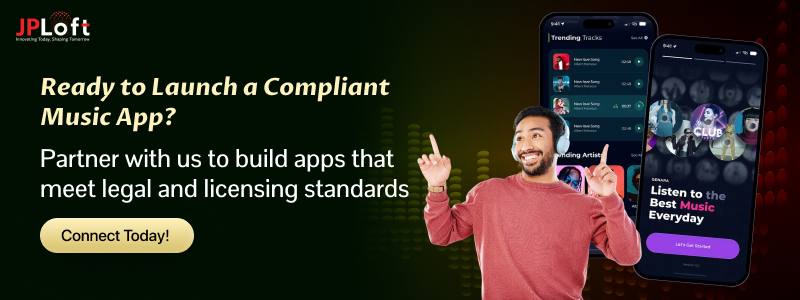
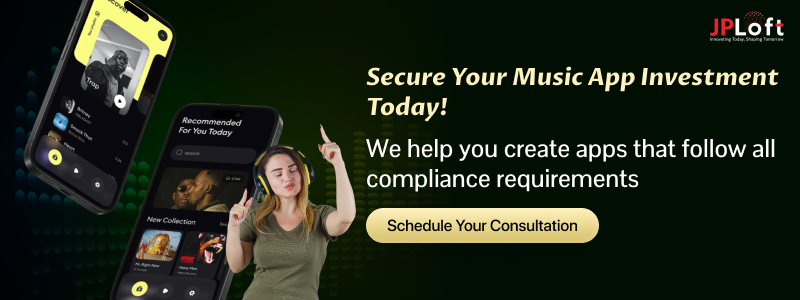

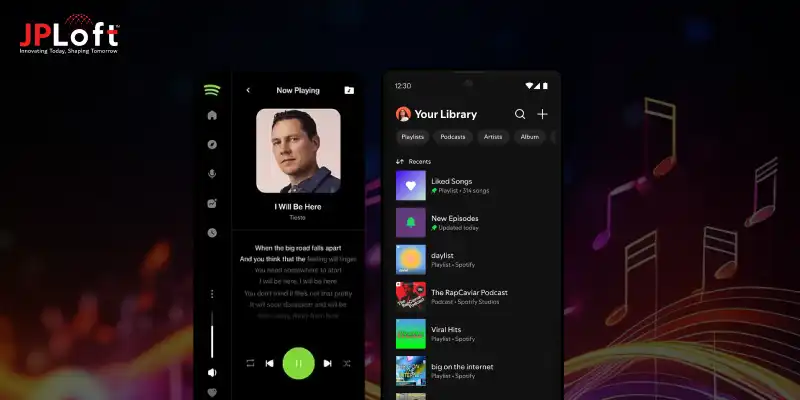
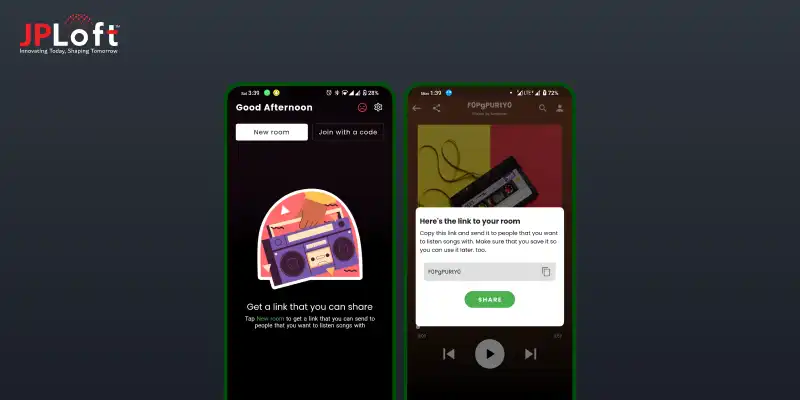
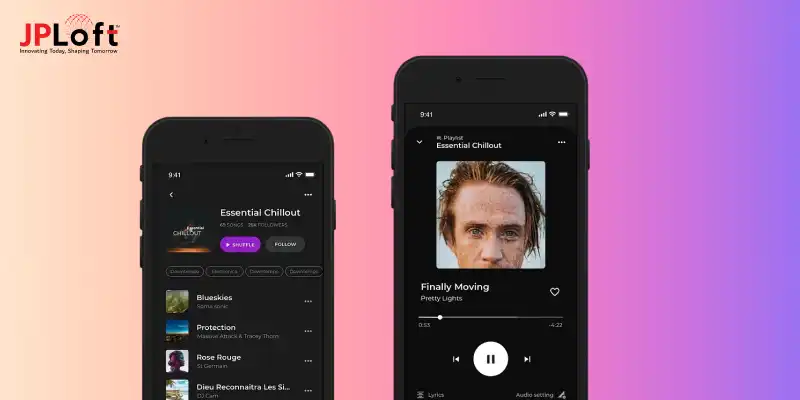


Share this blog